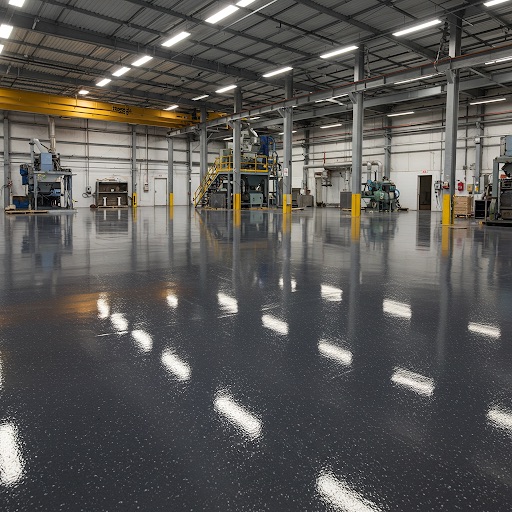Industrial epoxy flooring is a heavy-duty, high-performance coating designed to withstand extreme wear, chemical exposure, and heavy machinery. Unlike traditional flooring, epoxy bonds directly to concrete, creating a seamless, durable, and low-maintenance surface.
From warehouses and manufacturing plants to hospitals and laboratories, industrial epoxy is the go-to flooring solution for spaces that demand strength, hygiene, and long-term performance.
But is epoxy flooring worth the investment for your facility? Let’s explore costs, benefits, and installation requirements to help you decide.
The Benefits of Industrial Epoxy Flooring
Industrial facilities require flooring that can endure constant use, spills, and movement. Here’s why epoxy is the best choice:
1. Extreme Durability & Longevity
✔ Resistant to abrasions, heavy machinery, forklifts, and high foot traffic.
✔ Lasts 10–20 years with proper maintenance.
2. Chemical & Spill Resistance
✔ Protects against acids, oils, solvents, and industrial chemicals.
✔ Ideal for factories, labs, and food processing plants.
3. Low Maintenance & Easy Cleaning
✔ Seamless, non-porous surface prevents dirt buildup.
✔ Requires only routine mopping and occasional resealing.
4. Enhanced Safety Features
✔ Slip-resistant coatings improve traction in high-traffic areas.
✔ Anti-static (ESD) epoxy prevents electrical discharge in tech facilities.
5. Cost-Effective & Long-Lasting
✔ Cheaper than replacing damaged concrete floors.
✔ Reduces downtime with quick installation and fast curing times.
Industrial Epoxy Flooring Options & Cost Breakdown
Not all industrial epoxy coatings are the same. The right epoxy type depends on your facility’s needs, durability requirements, and budget.
Comparison Table: Industrial Epoxy Flooring Options
| Epoxy Type | Pros | Cons | Ideal For | Price Range (per sq. ft.) | Durability | Maintenance |
| Standard Industrial Epoxy | Cost-effective, chemical-resistant | Can be slippery when wet | Warehouses, storage facilities | $4 – $8 | 10–15 years | Low |
| High-Build Epoxy Coating | Extra thickness for heavy traffic | Requires professional installation | Manufacturing plants, factories | $6 – $12 | 12–20 years | Low |
| Quartz-Filled Epoxy | High durability, slip-resistant | Higher cost | Food processing, hospitals | $8 – $14 | 15+ years | Low |
| ESD Epoxy Flooring | Prevents static discharge | More expensive than standard epoxy | Electronics & tech industries | $8 – $15 | 12–18 years | Low |
| Self-Leveling Epoxy | Smooth, seamless finish | Requires perfect surface prep | Industrial spaces, labs | $5 – $10 | 10–15 years | Low |
| Epoxy Mortar Flooring | Ultimate strength, impact-resistant | Requires expert installation | Heavy-duty manufacturing | $8 – $16 | 15+ years | Low |
How Much Does Industrial Epoxy Flooring Cost?
The cost of industrial epoxy flooring depends on:
✔ Epoxy type – Standard coatings are cheaper, while high-performance and specialized epoxies cost more.
✔ Surface preparation – Repairs, grinding, and leveling increase costs.
✔ Size of the space – Larger areas typically reduce cost per square foot.
✔ Labor & installation – Professional installation ensures longevity but increases pricing.
Estimated Costs by Square Footage
| Floor Size | Estimated Cost Range |
| 1,000 sq. ft. | $4,000 – $16,000 |
| 5,000 sq. ft. | $20,000 – $80,000 |
| 10,000 sq. ft. | $40,000 – $160,000 |
| 50,000 sq. ft. | $200,000 – $800,000 |
👉 Pro Tip: Bulk installations for large warehouses or factories often come at a lower per-square-foot cost.
How is Industrial Epoxy Flooring Installed?
Industrial epoxy flooring requires professional installation to ensure maximum durability and adhesion.
1. Surface Preparation
✔ Grinding or shot blasting removes dirt, oil, and previous coatings.
✔ Crack and hole repairs ensure a smooth, even surface.
✔ Moisture barrier may be applied if needed.
2. Primer & Base Coat Application
✔ A primer enhances adhesion and prevents bubbling.
✔ The first epoxy coat is applied evenly over the surface.
3. Additional Coats & Custom Features
✔ Quartz, flake, or pigments can be added for extra strength and aesthetics.
✔ ESD coatings or slip-resistant additives are applied if needed.
4. Curing & Final Sealing
✔ Epoxy needs 24–72 hours to fully cure.
✔ A topcoat enhances durability and UV resistance.
Maintenance Tips for Industrial Epoxy Floors
While low-maintenance, proper care extends the life of your epoxy floor:
✔ Daily sweeping or dust mopping prevents dirt buildup.
✔ Weekly mopping with pH-neutral cleaners maintains the surface.
✔ Avoid harsh chemicals like ammonia or vinegar—they can weaken the epoxy.
✔ Inspect for wear and reapply a topcoat every 5–7 years to maintain protection.
FAQs About Industrial Epoxy Flooring
What is industrial epoxy flooring?
Industrial epoxy flooring is a durable, chemical-resistant surface applied over concrete to enhance strength, longevity, and safety in industrial environments.
How long does industrial epoxy last?
With proper installation and maintenance, industrial epoxy floors last 10–20 years, depending on traffic and exposure.
How much does it cost to epoxy 1,000 square feet?
The cost to install epoxy in a 1,000 sq. ft. facility ranges from $4,000 – $16,000, based on the epoxy type and surface preparation needed.
How much does epoxy flooring cost in the Philippines?
Epoxy flooring costs in the Philippines range from PHP 200 – PHP 1,200 per sq. ft., depending on material quality and labor.
Is epoxy cheaper than concrete?
Yes, epoxy costs less than replacing concrete and extends the lifespan of existing floors, making it a more cost-effective long-term solution.
Industrial epoxy flooring is one of the best investments for factories, warehouses, hospitals, and manufacturing plants. It provides superior durability, chemical resistance, and safety enhancements while reducing maintenance costs.
By choosing the right epoxy type and hiring professionals for installation, businesses can maximize efficiency, extend floor lifespan, and create a safe working environment.
If you’re looking for a high-performance flooring solution that will withstand the test of time, industrial epoxy flooring is the ultimate choice.

